cruise control Citroen JUMPY 2012 2.G Owner's Manual
[x] Cancel search | Manufacturer: CITROEN, Model Year: 2012, Model line: JUMPY, Model: Citroen JUMPY 2012 2.GPages: 268, PDF Size: 9.71 MB
Page 4 of 268
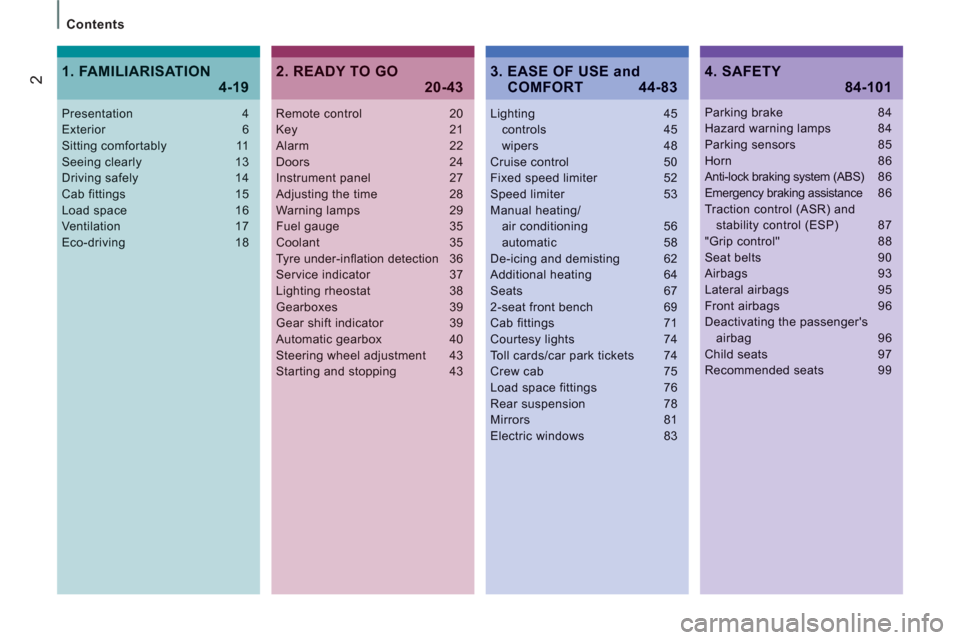
2
Contents
Remote control 20Key 21Alarm 22Doors 24Instrument panel 27Adjusting the time 28Warning lamps 29Fuel gauge 35Coolant 35Tyre under-infl ation detection 36Service indicator 37Lighting rheostat 38Gearboxes 39Gear shift indicator 39Automatic gearbox 40Steering wheel adjustment 43Starting and stopping 43
Lighting 45controls 45wipers 48Cruise control 50Fixed speed limiter 52Speed limiter 53Manual heating/air conditioning 56automatic 58De-icing and demisting 62Additional heating 64Seats 672-seat front bench 69Cab fittings 71Courtesy lights 74Toll cards/car park tickets 74Crew cab 75Load space fittings 76Rear suspension 78Mirrors 81
Electric windows 83
2. READY TO GO
20-43
4. SAFETY
84-101
Presentation 4Exterior 6Sitting comfortably 11Seeing clearly 13Driving safely 14Cab fittings 15Load space 16Ventilation 17Eco-driving 18
1. FAMILIARISATION
4-19
Parking brake 84Hazard warning lamps 84Parking sensors 85Horn 86Anti-lock braking system (ABS) 86Emergency braking assistance86Traction control (ASR) andstability control (ESP) 87"Grip control" 88Seat belts 90Airbags 93Lateral airbags 95Front airbags 96Deactivating the passenger'sairbag 96Child seats 97Recommended seats 99
3. EASE OF USE and COMFORT 44-83
Page 11 of 268
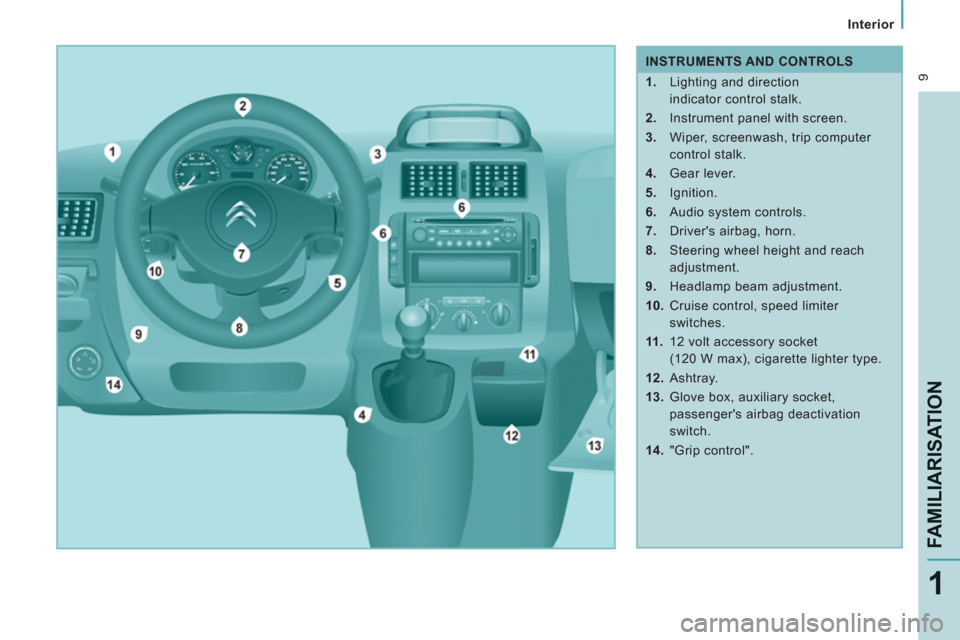
9
Interior
FAMILIARISATIO
N
1
INSTRUMENTS AND CONTROLS
1.
Lighting and direction
indicator control stalk.
2.
Instrument panel with screen.
3.
Wiper, screenwash, trip computer
control stalk.
4.
Gear lever.
5.
Ignition.
6.
Audio system controls.
7.
Driver's airbag, horn.
8.
Steering wheel height and reach
adjustment.
9.
Headlamp beam adjustment.
10.
Cruise control, speed limiter
switches.
11 .
12 volt accessory socket
(120 W max), cigarette lighter type.
12.
Ashtray.
13.
Glove box, auxiliary socket,
passenger's airbag deactivation
switch.
14.
"Grip control".
Page 16 of 268

9
9
3
9
3
3 Interior
14
DRIVING SAFELY
NaviDrive
This easy to use audio system offers a
map of Europe on SD Card, a Bluetooth
telephone connection and the playing of
MP3 / WMA files. 50, 53
Cruise control / Speed limiter
For the cruise control, he vehicle speed must
be higher than 25 mph (40 km/h) with at least
4th gear engaged.
For the speed limiter, the minimum vehicle speed
that can be programmed is 20 mph (30 km/h).
Audio system
This audio system incorporates a hard disk
with a capacity of 10 Gb, reserved for your
music.
The Jukebox function permits the selective
playing of up to 10 hours of music. The
detailed map of Europe is stored on this
hard disk, without the addition of a CD. It is
displayed on the 16/9 7" colour screen and
offers a 3D view.
Via your SIM card, the GSM hands-free
telephone also provides access to the
CITROËN emergency call centre (subject to
conditions).
MyWay
88
Grip control
This allows the vehicle to make progress in
most conditions of low grip.
Emergency or assistance call with
NaviDrive
This system allows an emergency or
assistance call to be sent to the dedicated
CITROËN centre.
For more information on the use of this
system, refer to section 9, "Technology on
board".
Fixed speed limiter
52
Page 20 of 268

Interior
18ECO-DRIVING
Eco-driving is a range of everyday practices that allow the motorist to optimise their fuel
consumption and CO
2 emissions.
Optimise the use of your
gearbox
With a manual gearbox, move off gently,
change up without waiting and drive by
changing up quite soon. If your vehicle has
the system, the gear shift indicator invites
you to change up; it is displayed in the
instrument panel, follow its instructions.
With an automatic or electronic gearbox,
stay in Drive "D"
or Auto "A"
, according to
the type of gearbox, without pressing the
accelerator pedal heavily or suddenly.
Control the use of your
electrical equipment
Before moving off, if the passenger
compartment is too warm, ventilate it by
opening the windows and air vents before
using the air conditioning.
Above 30 mph (50 km/h), close the windows
and leave the air vents open.
Switch off the headlamps and front
foglamps when the level of light does not
require their use.
Avoid running the engine before moving
off, particularly in winter; your vehicle will
warm up much faster while driving.
Drive smoothly
Maintain a safe distance between vehicles,
use engine braking rather than the
brake pedal, and press the accelerator
progressively. These practices contribute
towards a reduction in fuel consumption and
CO
2 emissions and also helps reduce the
background traffic noise.
If your vehicle has cruise control, make
use of the system at speeds above 25 mph
(40 km/h) when the traffic is flowing well.
As a passenger, if you avoid connecting
your multimedia devices (film, music,
video game...), you will contribute towards
limiting the consumption of electrical
energy, and so of fuel.
Disconnect your portable devices before
leaving the vehicle.
Remember to make use of equipment
that can help keep the temperature in the
passenger compartment down (sunroof
and window blinds...).
Switch off the air conditioning, unless it
has automatic digital regulation, as soon
as the desired temperature is attained.
Switch off the demisting and defrosting
controls, if not automatic.
Switch off the heated seat as soon as
possible.
Page 29 of 268
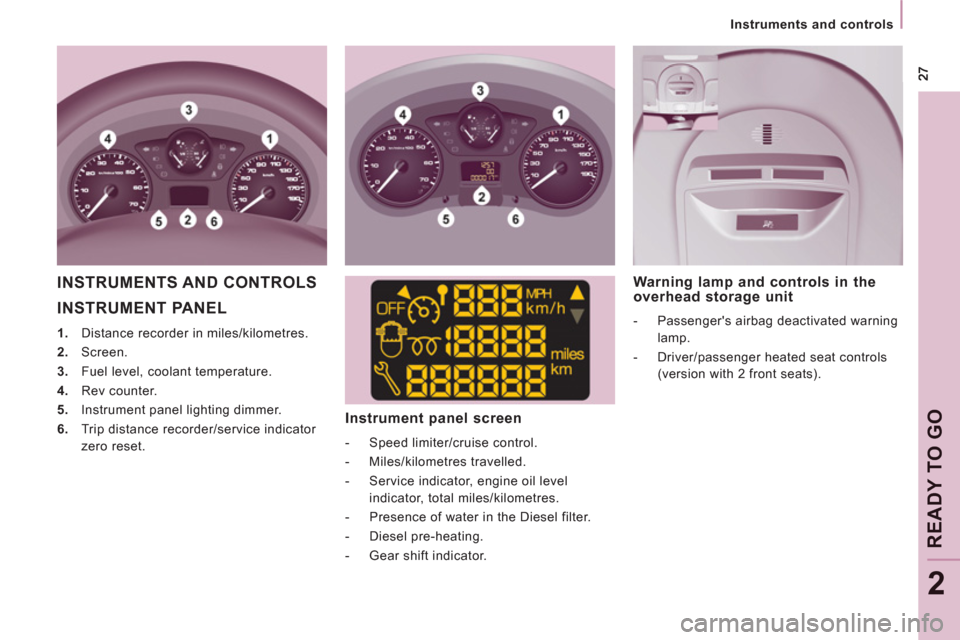
Instruments and controls
READY TO GO
2
INSTRUMENT PANEL
1.
Distance recorder in miles/kilometres.
2.
Screen.
3.
Fuel level, coolant temperature.
4.
Rev counter.
5.
Instrument panel lighting dimmer.
6.
Trip distance recorder/service indicator
zero reset.
Instrument panel screen
- Speed limiter/cruise control.
- Miles/kilometres travelled.
- Service indicator, engine oil level
indicator, total miles/kilometres.
- Presence of water in the Diesel filter.
- Diesel pre-heating.
- Gear shift indicator.
Warning lamp and controls in the
overhead storage unit
- Passenger's airbag deactivated warning
lamp.
- Driver/passenger heated seat controls
(version with 2 front seats).
INSTRUMENTS AND CONTROLS
Page 36 of 268
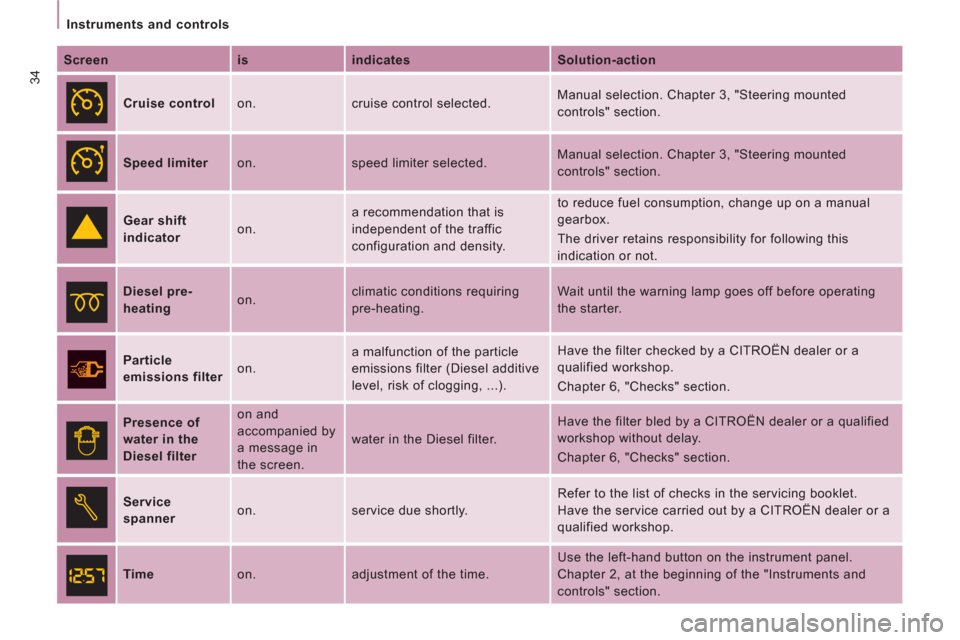
34
Instruments and controls
Screen
is
indicates
Solution-action
Cruise control on. cruise control selected. Manual selection. Chapter 3, "Steering mounted
controls" section.
Speed limiter on. speed limiter selected. Manual selection. Chapter 3, "Steering mounted
controls" section.
Gear shift
indicat
or on. a recommendation that is
independent of the traffic
configuration and density. to reduce fuel consumption, change up on a manual
gearbox.
The driver retains responsibility for following this
indication or not.
Diesel pre-
heating on. climatic conditions requiring
pre-heating. Wait until the warning lamp goes off before operating
the starter.
Particle
emissions filter
on. a malfunction of the particle
emissions filter (Diesel additive
level, risk of clogging, ...). Have the filter checked by a CITROËN dealer or a
qualified workshop.
Chapter 6, "Checks" section.
Presence of
water in the
Diesel filter on and
accompanied by
a message in
the screen. water in the Diesel filter. Have the filter bled by a CITROËN dealer or a qualified
workshop without delay.
Chapter 6, "Checks" section.
Service
spanner on. service due shortly. Refer to the list of checks in the servicing booklet.
Have the service carried out by a CITROËN dealer or a
qualified workshop.
Time on. adjustment of the time. Use the left-hand button on the instrument panel.
Chapter 2, at the beginning of the "Instruments and
controls" section.
Page 52 of 268

50
Steering mounted controls
CRUISE CONTROL "CRUISE"
In order for it to be programmed or
activated, the vehicle speed must be greater
than 25 mph (40 km/h) with at least 4th gear
engaged. Function selected,
display of the "Cruise
Control" symbol.
Function deactivated,
OFF
(example at
107 km/h).
Function activated
(example at 107 km/h).
Vehicle speed above
(e.g. 118 km/h),
the programmed speed
is displayed flashing.
Operating fault detected,
OFF
- the dashes flash. This cruise control shows the function
selection status in the instrument panel and
displays the programmed speed:
"This is the speed at which the driver wishes
to drive".
This aid to driving in free-flowing traffic
enables the vehicle to maintain the speed
programmed by the driver, unless a steep
gradient makes this impossible.
Page 53 of 268

51
Steering mounted controls
EASE OF USE
and COMFOR
T
3
Selecting the function
- Place the switch in the CRUISE
position.
The cruise control is selected but is
not yet active and no speed has been
programmed.
First activation/
programming a speed
- Reach the chosen
speed by pressing the
accelerator.
- Press the SET -
or SET +
button.
This programmes/activates the reference
speed and the vehicle will maintain this
speed.
Temporarily exceeding the speed
It is possible to accelerate
and drive
momentarily at a speed greater than the
programmed speed. The value programmed
flashes.
When the accelerator pedal is released, the
vehicle will return to the programmed speed.
Reactivation
- Following deactivation of the cruise
control, press this button.
Your vehicle will return to the last
programmed speed.
Alternatively, you can repeat the "first
activation" procedure.
Deactivation (off)
- Press this button or the
brake or clutch pedal.
Changing the
programmed speed
There are two methods
of memorising a speed
higher than the previous
one:
Without using the accelerator:
- press the Set +
button.
A brief press increases the speed by 1 mph
(km/h).
A maintained press increases the speed in
steps of 5 mph (km/h).
Page 54 of 268

52
Steering mounted controls
Switching the function off
- Place the dial in position 0
or switch off
the ignition to switch everything off.
Good practice
When changing the programmed reference
speed by means of a maintained press,
pay attention as the speed can increase or
decrease rapidly.
Do not use the cruise control on slippery
roads or in heavy traffic.
In the event of a steep slope, the cruise
control cannot prevent the vehicle from
exceeding the programmed speed.
In any event, the cruise control cannot
replace the need to observe the speed limits,
nor can it replace the need for vigilance and
responsibility on the part of the driver.
It is advisable to leave your feet near the
pedals.
To avoid any jamming under the pedals:
- ensure that the mat and its fixings on the
floor are positioned correctly,
- never place one mat on top of another.
Cancelling the programmed
reference speed
When the vehicle becomes stationary, after
switching off the ignition, the system no
longer memorises a speed. Using the accelerator:
- exceed the memorised speed until the
speed required is reached,
- press the Set +
or Set -
button.
To memorise a speed lower than the
previous one:
- press the Set -
button.
A brief press decreases the speed by 1 mph
(km/h).
A maintained press decreases the speed in
steps of 5 mph (km/h).
Operating fault
The programmed speed is cleared then
replaced by three dashes. Contact a
CITROËN dealer or a qualified workshop to
have the system checked.
FIXED SPEED LIMITER
If your vehicle is fitted with this function, the
speed of your vehicle can be limited to a
fixed speed of approximately 56, 60, 70 or
130 mph (90, 100, 110 or 130 km/h). The
fixed maximum speed cannot be changed.
The fixed speed limiter is not a function
of the cruise control type. It cannot be
activated or deactivated by the driver while
driving.
Page 260 of 268
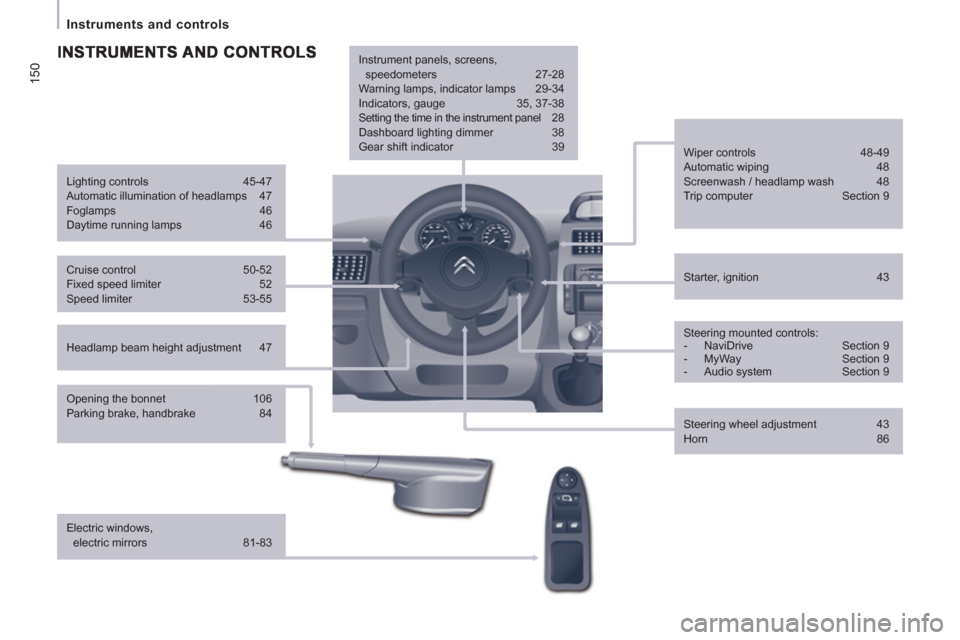
150
Instruments and controls
Headlamp beam height adjustment 47
Starter, ignition 43
Wiper controls 48-49
Automatic wiping 48
Screenwash / headlamp wash 48
Trip computer Section 9
Cruise control 50-52
Fixed speed limiter 52
Speed limiter 53-55
Steering mounted controls:
- NaviDrive Section 9
- MyWay Section 9
- Audio system Section 9
Lighting controls 45-47
Automatic illumination of headlamps 47
Foglamps 46
Daytime running lamps 46
Opening the bonnet 106
Parking brake, handbrake 84
Electric windows,
electric mirrors 81-83
Instrument panels, screens,
speedometers 27-28
Warning lamps, indicator lamps 29-34
Indicators, gauge 35, 37-38
Setting the time in the instrument panel 28
Dashboard lighting dimmer 38
Gear shift indicator 39
Steering wheel adjustment 43
Horn 86